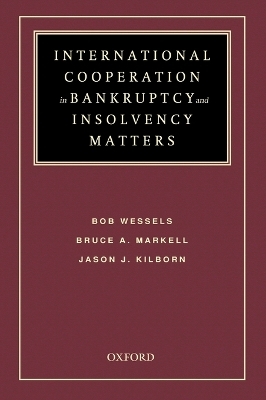
International Cooperation in Bankruptcy and Insolvency Matters
Oxford University Press Inc (Verlag)
978-0-19-534017-4 (ISBN)
The Honorable Bruce A. Markell (United States Bankruptcy Judge for the District of Nevada) was sworn in as the third bankruptcy judge in the District of Nevada on July 9, 2004. He came to the bench from the academy; since 1999, he had been the Doris S. and Theodore B. Lee Professor of Law at the William S. Boyd School of Law at the University of Nevada, Las Vegas, where he taught Contracts, Commercial Law, Securitization and Bankruptcy. He maintains a position at the Boyd School of Law as a Senior Fellow in Bankruptcy and Commercial Law. Judge Markell is a 1977 graduate of Pitzer College, and a 1980 graduate of the King Hall School of Law, University of California at Davis, where he was first in his class and editor-in-chief of the law review. Bob Wessels is the co-founder and Partner of Holland Van Gijzen Attorneys at Law, Rotterdam, The Netherlands and Professor of Business Law, Law Faculty, Vrije University in,Amsterdam. Dr. Wessels is the immediate past Chairman of the Ernst & Young Law Alliance, comprising some 3000 lawyers in 70 countries (1997-2002); Dean of the Civil Law Department of the Law Faculty of Vrije University (1992-1994); Served as Technical Consultant to the World Bank and the IMF in Georgia and Indonesia respectively. He presently advises clients, including non-Dutch parties, on matters of (international) corporate reconstruction and insolvency law and serves as an advisor for cases handled by partners of his firm, e.g. Versatel, Aino and UPC, some of them containing cross-border insolvency aspects, including concurrent proceedings in the Netherlands and abroad. Jason Kilborn teaches business and commercial law (including bankruptcy) at John Marshall Law School in Chicago. Before joining the academy, he spent two years in practice as an associate with Cleary, Gottlieb, Steen & Hamilton in New York and Wilmer, Cutler & Pickering in Washington, D.C., focusing on bankruptcy litigation and corporate reorganization. Professor Kilborn has developed a specialization in the comparative analysis of legal regimes for combating consumer financial distress.
Authors' Foreword ; Chapter 1 General Introduction ; Insolvency and Bankruptcy ; Roman times ; Middle Ages ; Commercial Code of Napoleon and the Rise of General Bankruptcy Law ; Emerging Tendencies From History ; Our Stance Today: Differences in National Legal Systems ; Chapter 2 Prominent Principles of Domestic Law ; Widely Accepted Broad Principles of Insolvency Systems ; Maximization of Asset Value For All Creditors ; Recognizing/Preserving Existing Creditor Rights ; Equitable Treatment Of Similarly Situated Creditors ; Wide Disparities With Respect to Specific Procedures and Rules ; (Un)Equal Treatment of Pre-Petition Claims ; Maximizing Value in a Common Pool ; Preparation and Voting on a Plan of Reorganization ; Principles-Based Approaches to Modernization and Harmonization ; Chapter 3 Guiding approaches to international insolvency law ; The Basic Theoretical Divide: Territorialism v. Universalism ; Territorialism and Its Discontents ; Universalism and Market Symmetry ; Weighing the Advantages and Practical Impediments of the Competing Approaches ; Predictability & Prevention of Forum Shopping ; Upholding Legitimate Expectations: "Vested Interests" and Fairness ; Minimizing Losses and Transaction Costs, Maximizing Value ; Alternatives ; Strengthening Universalism ; Cooperative Territorialism ; Mixing Universalism and Territorialism ; Choice of Law ; Modified Universalism ; Chapter 4 Unilateral & Bilateral Forms of National Cooperation ; Bilateral Treaties: From Medieval Origins to 19th and 20th Century Expansion ; Anglo-American Unilateral Cooperation: Legislation and Case Law ; United Kingdom: Common Law Cooperation and the Limited Role of s 426 ; United States: Early Resistance Gives Way To Statutory Cooperation, 304 ; Ambiguous Results On Both Sides of the Atlantic ; Several Unilateral Regimes in Modern Europe ; Germany ; Spain ; Belgium ; France ; Italy ; The Netherlands ; Eastern European States ; Chapter 5 Regional Cooperation and Regulation ; North America ; The Draft U.S.-Canada Bankruptcy Treaty ; The ALI "Principles of Cooperation Among the NAFTA Countries" ; The European Union ; Judicial Cooperation in Civil Matters ; Coordinated Universality as Basic Model ; International Jurisdiction ; Applicable Law ; Recognition of Insolvency Proceedings ; Secondary Insolvency Proceedings ; The Position of Creditors ; Reorganization and Winding-up of Financial Institutions ; Conclusion ; Other Regional Arrangements ; Latin America ; Northern Europe ; Central Africa ; Southeast Asia ; Chapter 6 Convergence Through Legislation and Professional Cooperation ; Harmonization Through Legislation ; Alignment By Courts and Practitioners ; The Model International Insolvency Cooperation Act ; Governance By Private Agreement: Cross-Border Insolvency Protocols ; The Cross-Border Insolvency Concordat and Recent Protocols ; Private Workouts and INSOL International's Statement of Principles ; Chapter 7 Modeling Cross-border Insolvency: The Role of UNCITRAL ; A Fair Framework for Effectively Addressing Cross-border Insolvency Cases ; The Model of the Model Law ; Limited Character ; Legislative Tool ; Practical Scope of the Model Law ; General Provisions ; Scope of Application ; Definitions ; Public Policy Exception ; Interpretation ; Access ; Unhindered Access ; Procedural Standing ; Position of Foreign Creditors ; Recognition of Foreign Proceedings ; Recognition and Its Effects ; Application for Recognition ; Decision to Recognize a Foreign Proceeding ; Relief ; Purpose of Relief ; Provisional Relief ; Additional Relief ; Protection of Interests ; Cross-border Cooperation and Communication ; International Practice ; Cooperation By Courts With Foreign Courts and Foreign Representatives ; Cooperation By Insolvency Office Holder With Foreign Courts and Foreign Representatives ; Means of Cooperation ; Coordination of Concurrent Proceedings ; Model of Concurrent Proceedings ; Territorial Proceedings ; Coordination of Proceedings ; Hotchpot Rule ; The Structure of the Model Law ; Appreciation in Legal Doctrine ; Enacting a Model Law ; Countries' Adoption of the Model Law ; Global Support ; Country by Country ; Conclusion
| Erscheint lt. Verlag | 30.4.2009 |
|---|---|
| Verlagsort | New York |
| Sprache | englisch |
| Maße | 257 x 173 mm |
| Gewicht | 635 g |
| Themenwelt | Recht / Steuern ► EU / Internationales Recht |
| Recht / Steuern ► Wirtschaftsrecht ► Bank- und Kapitalmarktrecht | |
| ISBN-10 | 0-19-534017-5 / 0195340175 |
| ISBN-13 | 978-0-19-534017-4 / 9780195340174 |
| Zustand | Neuware |
| Haben Sie eine Frage zum Produkt? |
aus dem Bereich


